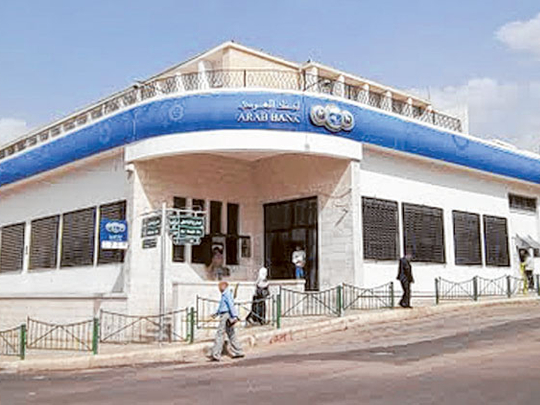
Amman: Jordan’s largest lender, Arab Bank Group, posted a 15 per cent rise in 2012 net profit to $352 million (Dh1.3 billion) on higher revenues, with its chairman saying a conservative policy eased the impact of political upheaval across the Arab region.
Its focus on top-tier assets and steering away from significant lending to governmental entities has served it in a climate where banks exposed to former toppled governments in the Middle East had suffered, bankers say.
Chairman Sabih Al Masri said in a statement the bank, one of the Middle East’s major financial institutions with a strong presence across the region, saw deposits increase by $1.2 billion to $32.9 billion against $31.7 billion at end of 2011.
“This exceptional performance shows the bank’s ability to adjust to the changes and the circumstances the Arab region is going through by adopting a conservative credit policy” Masri said.
Investment analysts say the bank has traditionally had a lower risk appetite than peers and it favours capitalisation and liquidity versus profitability.
Masri said the results showed that Arab Bank, which has a $45.6 billion balance sheet spread across 30 countries and five continents, was able to maintain the steady growth it has shown in recent years.
The Amman-based Arab Bank’s growth has long been tied to its regional and global expansion and it has built a reputation for low vulnerability to major political upheaval.
Masri also said the board proposed paying 30 per cent of 2012 profits in a cash dividend, up from 25 per cent in 2011.
Capital adequacy
Arab Bank’s chief executive officer Nemeh Al Sabbagh said the bank would focus on keeping a high level of liquidity, with a capital adequacy of 15.09 per cent at the end of 2012.
“It’s important to keep high liquidity which is a main pillar of the bank’s solid financial position,” Sabbagh said.
Net operating income of the bank, which has a $45 billion balance sheet, rose 8 per cent in 2012 as a result of growth in net interest and cost cutting measures, Sabbagh said.
Non-performing loans as of total of credit facilities were a minimum with non-performing loans covered by 100 per cent of provisions, Sabbagh said.
Sabbagh said the bank, one of several major regional and international banks exposed to the debt ridden Saudi conglomerates Saad and Algosaibi, had now fully set aside provisions for their exposure in the troubled firms.
Bankers said Arab Bank set aside nearly $1 billion in provisions in the last two years to cover non-performing loans by businesses reeling from the global downturn, but was cushioned by a healthy capital base.
The firm is one of the Arab world’s largest privately owned banks. Over 20 per cent is owned by the family of Lebanon’s former prime minister, Rafiq Al Hariri, who was assassinated in 2005. Jordan’s social pension fund has a 15.5 stake.
The remainder is mainly held by long-term investors. Arab Bank owns 40 per cent of Saudi Arabia’s Arab National Bank ANB.











